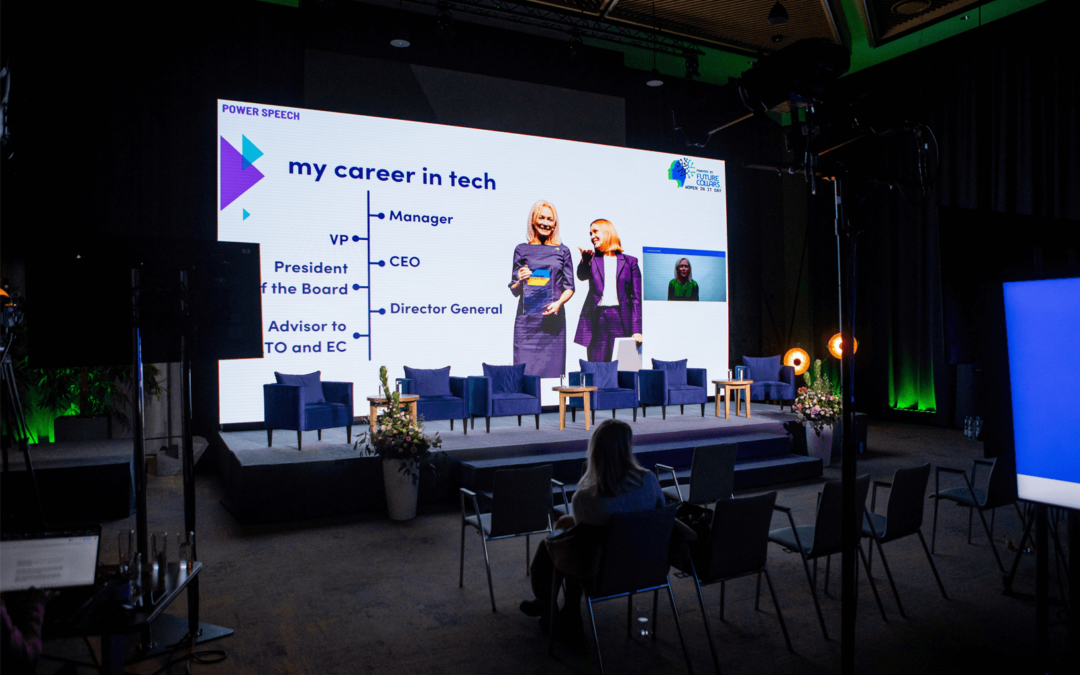How can we map the best initiatives supporting women to start a career in tech, or reconvert, or upskill to add digital competences to their current professional profiles? The European Digital Skills Awards 2023, organised by the Digital Skills and Jobs Platform of the European Commission, certainly provided some answers, and what a rich panorama of projects, grassroots initiatives and EU funded initiatives emerged among the awards applications!
Originally launched in 2018, the Awards aim at rewarding sustainable, scalable, impactful projects of all shapes and sizes that are supporting Europeans to get the digital skills they need. But what about European women and girls, in the specific? In 2023 the awards category dedicated to women was specifically focused on careers in ICT. Not basic digital skills, but skills to thrive in the job market, and the jury members of the Awards definitively had a lot to read and evaluate on this topic, from all over Europe and beyond.
Of the 330 applications that were received, 36 were sent for the category “Women in ICT careers”, and 5 were elected finalists: let’s discover them and meet the winners.
Engenheiras Por Um Dia (Portugal): Women Engineers Breaking Stereotypes
To counterbalance the stereotype that women do not choose an engineering curriculum, Engenheiras Por Um Dia (which means Women Engineers for a Day) was launched in 2017, and focuses on promoting engineering and technology among primary and secondary education students in Portugal. The program involves tailored challenges, study visits, and workshops to engage students throughout the academic year. Recognized in key strategic documents of the Portuguese government, the program has grown to include over 12,000 students, demonstrating its impact on digital inclusion for women.
Girls Go Circular: fostering Digital and Leadership Skills
Funded by the European Union, the Girls Go Circular project has adopted a learn-by-doing approach to engage students in different activities such as online research, entrepreneurial role-plays or challenge-based exercises. An online platform – Circular Learning Space – has been created to help students access the resources needed to develop their skills, and the students work on 4 key challenges faced today regarding metals, fashion and textiles, plastics, smartphones.
A totally different initiative, the European Digital Women Diversity Charter, spearheaded by the Council of European Professional Informatics Societies (CEPIS), provides a roadmap to reduce gender disparity in IT and tech roles.
With Bronze, Silver, and Gold certification levels, the initiative encourages organizations to showcase their commitment to gender diversity, fostering a community of good practices. The initiative has also created a community around the good practices, in which each association can share experiences, best practices and solutions on the issues faced by the charter. In this way companies and associations can access a database of best practices on how to create more inclusive teams and hiring policies.
Women in IT Career Day (Poland): Empowering Women at Every Stage of their professional life
Sounds familiar? Well, yes, the Women in IT Career Day edition of 2022 received the status of finalist in the Women in ICT careers category, for its innovative format, strong impact and values that have been supporting women in ICT in Poland, and since this year’s edition, internationally.
The openness also towards women in ICT from Ukraine was also a very important factor, with the event interpreted in Ukrainian during the 2022 edition.
And the winner is….Girls Code It Better!
Initiated in 2014 by the Officina Futuro W-Group Foundation, the initiative Girls Code it Better aims to narrow the gender gap in digital skills among secondary school girls in Italy. The project addresses stereotypes through extracurricular courses spanning diverse tech areas like 3D design, web development, and virtual reality.
With 390 clubs, 7,500 girls, and support from private and public partners, the initiative scores high in sustainability. It has become a beacon for guiding young female students toward careers in ICT and STEM in Italy.
These initiatives highlight the efforts in many European countries to empower women in ICT, transcending borders and stereotypes. By providing opportunities, mentorship, and a supportive community, these projects contribute to a more inclusive and diverse future in the tech industry. As we celebrate their successes, it becomes evident that the collaborative efforts of governments, organizations, and individuals are essential for fostering gender equality in the world of technology. The main hope has to be that in a very short time the gender gap will be a thing of the past, and we will not even need anymore a dedicated category in the European Digital Skills Awards. In the meantime, we look forward to discovering the finalists and winners of the European Digital Skills Awards 2024 edition! The applications will open in Spring 2024.







